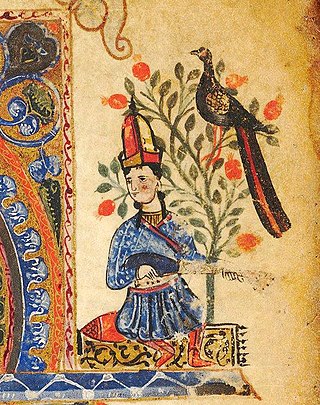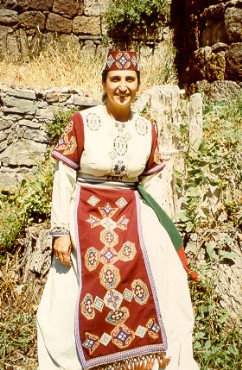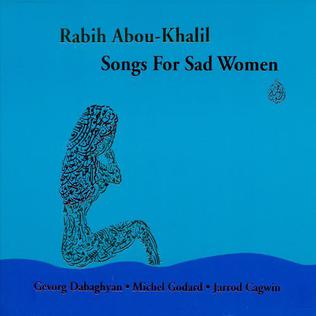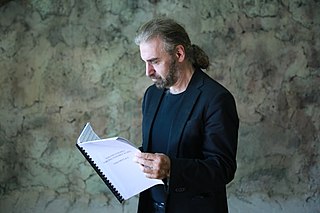Related Research Articles

Yo-Yo Ma is a French-American cellist. Born to Chinese parents in Paris, he was regarded as a child prodigy there and began to study the cello with his father at age four. At the age of seven, Ma moved with his family to Boston and later to New York City, where he continued his cello studies at the Juilliard School before pursuing a liberal arts education at Harvard University. He has performed as a soloist with orchestras around the world. He has recorded more than 92 albums and received 19 Grammy Awards.

Djivan Gasparyan was an Armenian musician and composer. He played the duduk, a double reed woodwind instrument related to the orchestral oboe. Gasparyan is known as the "Master of the duduk". In 2006 he was nominated for Grammy awards for the Best Traditional World Music Album.

The music of Armenia has its origins in the Armenian highlands, dating back to the 3rd millennium BCE, and is a long-standing musical tradition that encompasses diverse secular and religious, or sacred, music. Folk music was notably collected and transcribed by Komitas Vardapet, a prominent composer and musicologist, in the late nineteenth and early twentieth centuries, who is also considered the founder of the modern Armenian national school of music. Armenian music has been presented internationally by numerous artists, such as composers Aram Khachaturian, Alexander Arutiunian, Arno Babajanian, Haig Gudenian, and Karen Kavaleryan as well as by traditional performers such as duduk player Djivan Gasparyan.

The duduk or tsiranapogh, is a double reed woodwind instrument made of apricot wood originating from Armenia. Variations of the Armenian duduk appear throughout the Caucasus, the Balkans, and the Middle East, including Bulgaria, Azerbaijan, Georgia, Kurdistan, Turkey, and Iran. Duduk, Balaban, and Mey are almost identical, except for historical and geographical differences.

Wu Man is a Chinese pipa player and composer. Trained in Pudong-style pipa performance at the Central Conservatory of Music in Beijing, she is known for playing in a broad range of musical styles and introducing the pipa and its Chinese heritage into Western genres. She has performed and recorded extensively with Kronos Quartet and Silk Road Ensemble, and has premiered works by Philip Glass, Lou Harrison, Terry Riley, Bright Sheng, Tan Dun, Zhao Jiping, and Zhou Long, among many others. She has recorded and appeared on over 40 albums, five of which have been nominated for Grammy Awards. In 2013, she was named Instrumentalist of the Year by Musical America, becoming the first performer of a non-Western instrument to receive this award. She also received The United States Artists Award in 2008.
Silkroad, formerly the Silk Road Project, Inc., is a not-for-profit organization, initiated by the cellist Yo-Yo Ma in 1998, promoting collaboration among artists and institutions, promoting multicultural artistic exchange, and studying the ebb and flow of ideas. The project was first inspired by the cultural traditions of the historical Eurasian Silk Road trade routes and now encompasses a number of artistic, cultural and educational programs focused on connecting people and ideas from around the world. It has been described as an "arts and educational organization that connects musicians, composers, artists and audiences around the world" and "an initiative to promote multicultural artistic collaboration."

Cristina Pato Lorenzo is a Galician bagpiper, pianist and composer. She is a member of the Silk Road Ensemble led by Yo-Yo Ma and an educational adviser to the Silk Road Project. In 2017 she was collaborating with Harvard University as one of its Blodgett Distinguished Artists in Residence. Cristina Pato is a member of the Artist Committee of Americans for the Arts and a regular collaborator of the Turnaround Arts educational program of the President's Committee on the Arts and the Humanities.
The Shoghaken Folk Ensemble is an Armenian musical group that performs and records Armenian folk and ashugh (troubadour) music. The ensemble was founded in 1991 in Yerevan. It has since performed in various countries, including France, Germany, Estonia, Russia, and the United Arab Emirates. In the US, they performed at an eighteen-concert 2004 tour and at the 2002 Folklife Festival as part of the Silk Road project organized by Yo-Yo Ma. The ensemble was also featured on the soundtrack to the Atom Egoyan film Ararat. In 2008, Shoghaken gave concerts during their second major tour of the US and Canada; the tour coincided with the release of the ensemble's latest CD, Shoghaken Ensemble: Music From Armenia.

Hasmik Harutyunyan is an Armenian folk singer. She is the leading member of the Shoghaken Folk Ensemble and directs the Hayrik Mouradian Traditional Song and Dance Children's Ensemble.
Ganbaataryn Khongorzul is a traditional long song singer from Mongolia.

Aynur Doğan is a contemporary Kurdish singer and musician from Turkey.
Christopher Adler is a musician, composer and music professor at University of San Diego. A virtuoso player of the khaen, a reed instrument native to Laos and Thailand, he has been composing works for the khaen both as a solo instrument and in combination with western instruments since 1996. His works for solo piano include the three-part Bear Woman Dances, commissioned to accompany a dance depicting a Korean creation myth and largely based the Korean musical system nongak. Four of his compositions have been broadcast internationally on WGBH's Art of the States series. His composition for sheng, viola and percussion, Music for a Royal Palace, was commissioned by Carnegie Hall for Yo-Yo Ma's Silk Road Project. An homage to Thailand's Bang Pa-In Palace, the work incorporates traditional Thai melody and embellishments. It was performed at Zankel Hall in 2006 and recorded at the Tanglewood Music Center that same year. His Serpent of Five Tongues for sheng and guanzi premiered at the 2011 MATA Festival.
Harold G. Hagopian is an American violinist, entrepreneur, record producer and founder of Traditional Crossroads world music record label in 1993.

Joseph Gramley is an American multi-percussionist, teacher and composer, and a founding member of the Silk Road Ensemble. As a solo performer he each year commissions and premieres new works from such emerging composers as Kojiro Umezaki and Justin Messina. His first solo recording, American Deconstruction, featuring performances of five milestone works in multi-percussion's modern repertoire, appeared in 2000 and was reissued in 2006. His second CD, Global Percussion, was released in 2005.

Sandeep Das is an Indian tabla player and composer currently based in Boston, Massachusetts, United States.
The Gurdjieff Folk Instruments Ensemble based in Armenia was founded in 2008, and is led by the Armenian musician, Levon Eskenian. The Ensemble’s awards include the prestigious Dutch Edison Award: Best World Music Album 2012 and Armenian National Music Award: Best Folk Music Album 2011, for their album, “Music of Georges I. Gurdjieff,’’ produced by ECM Records. The ensemble consists of Armenia’s leading practitioners of traditional music performing on Duduk, Blul, Kamancha, Oud, Kanōn, Santur, Tar/Saz, Dap/Daf, Dhol, and Tombak. The repertoire is composed of the “mystic and spiritual teacher,” George I. Gurdjieff's Armenian, Greek, Assyrian, Arabic, Kurdish, Caucasian spiritual and folk music, authentically arranged for Eastern instruments by Eskenian. The repertoire also includes additional Eastern music that exemplifies Gurdjieff’s musical influences during his travels in the East.
Armenian folk music is a genre of Armenian music. It usually uses the duduk, the kemenche, and the oud. It is very similar to folk music in the Caucasus and shares many similar songs and traditions with countries around Armenia, namely Georgia and Azerbaijan.

The Moscow International Duduk Festival, MIDF is an international annual music festival of Armenian national musical instrument of Duduk held in Moscow.

Songs for Sad Women is an album by the Lebanese oud player and composer Rabih Abou-Khalil which was recorded in Germany in 2005 but not released on the Enja label until 2007.

The Naghash Ensemble is a contemporary music ensemble from Armenia featuring three female singers, duduk, oud, dhol and piano. They perform new music written by Armenian-American composer John Hodian based on sacred texts by the medieval Armenian mystic poet and priest, Mkrtich Naghash. Described as "The sound of ancient Armenia reinvented for the 21st century" by Armenian composer Tigran Mansurian, Hodian's "Songs of Exile" combines "the earthy spirituality of Armenian folk song, new classical music, contemporary post-minimalism and the energy of rock and jazz".
References
- ↑ Afrique magazine , Issues 269-274. Groupe Jeune Afrique. 2008. p. 53.
- 1 2 Nidel, Richard (2005). World music: the basics. Psychology Press. p. 151. ISBN 978-0-415-96800-3.
- ↑ Jenkins, Mark (8 February 2008). "Rev. of Shoghaken Ensemble, Music From Armenia". The Washington Post . Retrieved 7 December 2010.
- ↑ Cohen, Aaron (19 April 2004). "Shoghaken shines light on Armenia". Chicago Tribune . Archived from the original on November 4, 2012. Retrieved 7 December 2010.
- ↑ Toumani, Meline (10 April 2005). "Music: A Silk Road That Leads Somewhere Truly New". The New York Times . Retrieved 7 December 2010.